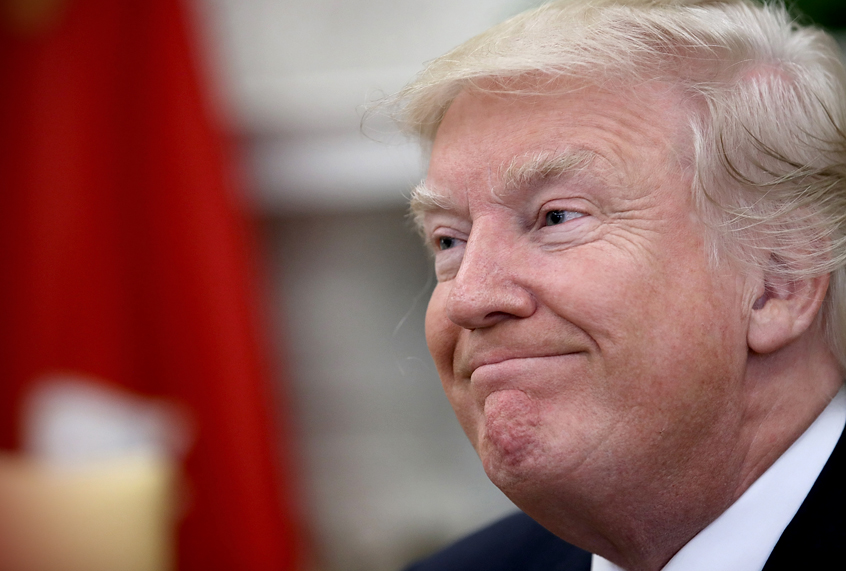President Donald Trump’s speech on Monday about national security has been met with a decidedly mixed response.
“Optimism has surged. Confidence has returned. With this new confidence, we are also bringing back clarity to our thinking. We are reasserting these fundamental truths: A nation without borders is not a nation. A nation that does not protect prosperity at home cannot protect its interests abroad,” Trump said in his speech. “A nation that is not prepared to win a war is a nation not capable of preventing a war. A nation that is not proud of its history cannot be confident in its future, and a nation that is not certain of its values cannot summon the will to defend them.”
Many aspects of Trump’s speech, and the national security document it outlined (the National Security Strategy), seemed to contradict the president’s own policies.
At one point the document singled out Russia and China for “attempting to erode American security and prosperity,” even though Trump has spent much of his presidency cozying up to Russia, including attempting to lift sanctions imposed by President Barack Obama and calling Russian President Vladimir Putin to thank him for saying kind words about Trump’s economic policies. While the speech echoed these claims, arguing that Russia and China “seek to challenge American influence, values, and wealth,” Trump appeared eager to offset that criticism when he added this anecdote:
Yesterday I received a call from President Putin of Russia thanking our country for the intelligence that our CIA was able to provide them concerning a major terrorist attack planned in St. Petersburg, where many people, perhaps in the thousands, could have been killed. They were able to apprehend these terrorists before the event, with no loss of life. And that’s a great thing, and the way it’s supposed to work. That is the way it’s supposed to work.
As CNN’s Jim Acosta noted, the National Security Strategy document mentioned Russia’s alleged meddling in the 2016 presidential election, which Trump has continued to deny.
“Today, actors such as Russia are using information tools in an attempt to undermine the legitimacy of democracies,” the document pointed out. Trump’s speech, however, made no similar mention.
The National Security Strategy document also claimed that America “must upgrade our diplomatic capabilities to compete in the current environment,” even though Trump has left a number of key State Department posts unstaffed. The president has also had a notoriously poor relationship with Secretary of State Rex Tillerson, whom he has repeatedly embarrassed and who arrived noticeably late to the president’s address after hosting the French foreign minister, who publicly criticized Trump’s foreign policy as “a position of retreat.”
Trump’s speech also drew criticism from a wide array of foreign policy pundits.
Former U.S. ambassador to NATO, Nicholas Burns, noted the glaring disconnect between Trump’s words on Monday and his actions during his first year in office:
Contradiction in Trump #NationalSecurityStrategy: his policy of last 12 months a radical departure from every President since WWII. Trump weak on NATO, Russia, trade, climate, diplomacy. U.S. declining as global leader. These actions more revealing than a strategy document.
— Nicholas Burns (@RNicholasBurns) December 18, 2017
The other obvious contradiction in President Trump’s #NationalSecurityStrategy: he needs a strong State Department to implement it. Instead, State and the Foreign Service are being weakened and often sidelined.
— Nicholas Burns (@RNicholasBurns) December 18, 2017
Yet another contradiction in Trump #NationalSecurityStrategy: in nearly every part of the world, foreign leaders believe the U.S. is weakening as the global leader. That is how America First looks to the rest of the world.
— Nicholas Burns (@RNicholasBurns) December 18, 2017
Major contradiction in Trump #NationalSecurityStrategy on Russia—it is a competitor. So, why is he not defending us against Russia’s interference in our election?
— Nicholas Burns (@RNicholasBurns) December 18, 2017
As did Barack Obama’s former national security advisor, Ben Rhodes:
As is often the case on foreign policy, Trump is at odds with the views within the government. Foreign governments will put more stock in Trump's words than strategy documents. https://t.co/BZcpw39Vfd
— Ben Rhodes (@brhodes) December 18, 2017
2. And yes, I agree that economic security is national security. But then why are we risking that with a tax bill that adds trillions to the debt – much of which we owe foreign nations we're competing with! This National Security Strategy doesn't help us meet challenges abroad
— Senator Bob Menendez (@SenatorMenendez) December 18, 2017
18 mins in and we get the first mention of the NSS.
— Tom Wright (@thomaswright08) December 18, 2017
He hardly spoke about Russia. One passing mention as a competitor immediately followed by how much he wants partnership. NSS takes a very different tack
— Tom Wright (@thomaswright08) December 18, 2017
This sounds like the foreign policy equivalent of American carnage.
— Katty Kay (@KattyKay_) December 18, 2017
Not all of the reactions to Trump’s speech were negative.
In an editorial for Fox News, former House Speaker Newt Gingrich praised it as a rebuke to the post-Cold War foreign policies that “built their strategic efforts around a system of global multilateralism defined by lawyers, diplomats, and elite media.”
He added, “President Trump’s national security speech today should be read by every American who is concerned about national safety (which is the goal of national security).”
There was also this tweet by David Reaboi of Security Studies Group.
Trump’s speech today showed that he’s very much in line with tradition of conservative foreign policy, from Goldwater to Reagan. It’s the Bush folks who were outliers.
— David Reaboi, Late Republic Nonsense (@davereaboi) December 18, 2017


